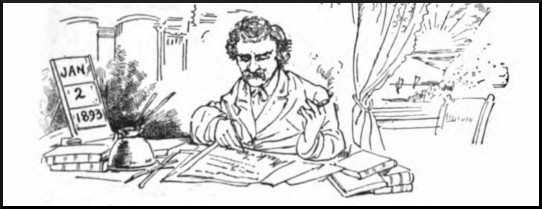Mark Twain? Apocryphal?

Question for Quote Investigator: Recently, I encountered an insightful quotation about courage attributed to Mark Twain that I had not seen before:
Courage is resistance to fear, mastery of fear, and not the absence of fear.
Is this a genuine Twain quotation? Where did it appear?
Reply from Quote Investigator: In December 1893 Mark Twain began to serialize the novel “Pudd’nhead Wilson” in “The Century Magazine”.1
In 1894 he published the full work under the title “The Tragedy of Pudd’nhead Wilson and the Comedy Those Extraordinary Twins”. The twelfth chapter began with the following lengthy epigraph. Boldface added to excerpts by QI:2
Courage is resistance to fear, mastery of fear—not absence of fear. Except a creature be part coward it is not a compliment to say it is brave; it is merely a loose misapplication of the word. Consider the flea!—incomparably the bravest of all the creatures of God, if ignorance of fear were courage.
Whether you are asleep or awake he will attack you, caring nothing for the fact that in bulk and strength you are to him as are the massed armies of the earth to a sucking child; he lives both day and night and all days and nights in the very lap of peril and the immediate presence of death, and yet is no more afraid than is the man who walks the streets of a city that was threatened by an earthquake ten centuries before.
When we speak of Clive, Nelson, and Putnam as men who “didn’t know what fear was,” we ought always to add the flea—and put him at the head of the procession.
—Pudd’nhead Wilson’s Calendar.
Below are additional selected citations in chronological order.
In July 1894 a commentator in “The Century Magazine” highlighted the quotation and endorsed its accuracy:3
“Courage is resistance to fear, mastery of fear—not absence of fear.” – Pudd’nhead Wilson in March CENTURY.
If Mark Twain had been a soldier himself, and had felt that mortal chill which strikes a fellow when the bullets begin to whistle and his comrades begin to fall on right and left, he couldn’t know more about it.
In 1920 “The Washington Post” printed the saying together with miscellaneous expressions under the title “Words of Wise Men”, but no attribution was specified:4
- Penury is often the wages of the pen.
- Few things are impossible to diligence and skill.
- Courage is resistance to fear, mastery of fear, not absence of fear.
- The best time to make good resolutions is not so much the New Year as the beginning of each new day.
In 1948 the compilation “Mark Twain at Your Fingertips” included the quotation while correctly citing “Pudd’nhead Wilson”.5
In 1977 “The New York Times” published a movie review that referenced the quotation. The phrasing was slightly altered via the addition of the word “and”:6
. . . “Jacob the Liar” is, in effect, a heartwarming saga and one that illustrates Mark Twain’s observation that “courage is resistance to fear, mastery of fear, and not the absence of fear.”
In conclusion, Mark Twain should receive credit for the passage he wrote in 1894. The quotation is genuine.
Image Notes: Depiction of Mark Twain writing from page 16 of the 1894 illustrated edition of “The Tragedy of Pudd’nhead Wilson and the Comedy Those Extraordinary Twins”. Image has been retouched, resized, and cropped.
Acknowledgement: Great thanks to Steven Klein whose inquiry led QI to formulate this question and perform this exploration. Klein pointed out the 1977 citation.
Update History: On March 31, 2025 the format of the bibliographical notes was updated.
- 1894 March, The Century Magazine, Volume 47, Number 5, (Serialization begun in December 1893; target quotation appeared in March 1894), Section: Pudd’nhead Wilson by Mark Twain, Pudd’nhead Wilson’s Calendar, (epigraph at beginning of chapter 12), Quote Page 772, The Century Company, New York. (HathiTrust Full View) link ↩︎
- 1894, The Tragedy of Pudd’nhead Wilson; And the Comedy Those Extraordinary Twins by Mark Twain (Samuel L. Clemens), Pudd’nhead Wilson’s Calendar, (Epigraph at beginning of chapter 12), Quote Page 155, American Publishing Company, New York. (HathiTrust Full View) link ↩︎
- 1894 July, The Century Magazine, Volume 48, Number 3, Section: In Lighter Vein, Confirmation of Pudd’nhead Wilson’s Views on Valor by H.K.D., Quote Page 480, Column 1, The Century Company, New York. (HathiTrust Full View) link ↩︎
- 1920 November 6, The Washington Post, Words of Wise Men, Quote Page 9, Column 2, Washington, D.C. (ProQuest) ↩︎
- 1948, Mark Twain at Your Fingertips, Compiled by Caroline Thomas Harnsberger, Topic: Courage, Quote Page 70, Cloud, Inc., Beechhurst Press, Inc., New York. (Verified on paper) ↩︎
- 1977 April 25, The New York Times, ‘Jacob the Liar,’ a Film About the Polish Ghetto by A. H. Weiler, Quote Page 38, Column 3, New York. (ProQuest) ↩︎